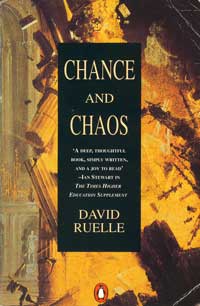
David Ruelle
Penguin, London, 1993
ISBN 0-14-017108-8
In less than 200 pages, eminent Belgian mathematical physicist Ruelle provides a brilliant account of key ideas and discoveries in the field of chaos theory. Unlike the many popular science books that treat readers like children or distort by over-simplification, this book employs rigour and elegance to equip the reader to think seriously about the topics covered. The writing is peppered with wry humour, and backed up, in the notes, with more challenging explanations, in mathematical form, of the ideas in the main text. Unfortunately, yet again, Penguin fail to supply an index.
Particularly appealing for those taking a tetrahedronal, Fullerian approach to the world, is this outlook at the beginning:
"Beyond the problem of chance... we shall try to understand something of the triangular relation between the strangeness of mathematics, the strangeness of the physical world, and the strangeness of our own human mind." (p.7)
The other apex, concerning the social-historical, which Ruelle omits here, is actually considered at various points in the book.
The chapter on Lotteries and Horoscopes explains what it is for events to be independent from the point of view of probability theory, and notes that,
"if we look at things carefully, we find that the same arguments that tell us that Venus has an effect on the weather prevent us from knowing precisely what this effect is. In other words, rain this afternoon and the fact that Venus is here or there remain independent events..." (p.23)
Ruelle goes on to admit that, on a personal level, horoscopes may be harmless and amusing, but then says:
"One may, however, be indignant at the fact that some business enterprises make hiring decisions on the basis of horoscopes. This sort of 'astral' discrimination is worse than simply stupid, it is downright dishonest." (p.25)
Between them, Ruelle and his colleague Floris Takens coined the term strange attractor, so he may reasonably be supposed to know what he is talking about when he discusses the often misunderstood relationship between exciting new stuff like chaos and quanta, and unloved old stuff like determinism:
"What we now call chaos is a time evolution with sensitive dependence on initial conditions. The motion on a strange attractor is thus chaotic. One also speaks of deterministic noise when the irregular oscillations that are observed appear noisy, but the mechanism that produces them is deterministic." (p.67)
If you want to say that quantum mechanics is deterministic, it is: the Schrödinger equation predicts unambiguously the time evolution of the probability amplitudes. If you want to say that quantum mechanics is probabilistic, you may: the only predictions are about probabilities." (p.94)
There is far too much in this rich book to cover in a few paragraphs, but I must find room for this remark about music, found at the end of the chapter on Information:
Think of musical melodies; they are messages that we feel we understand, yet we are quite incapable of saying what they mean. The existence of music is a permanent intellectual scandal, but it is just one scandal among many others." (p.135)
Finally, and naturally enough, we move from music to sex. Ruelle's chapter on genetic information and sexual reproduction includes this punchline:
"This then is the true meaning of sex: that there is some regularity in the universe, and that genetic recombination is therefore useful." (p.153)
© Paul Taylor 2002